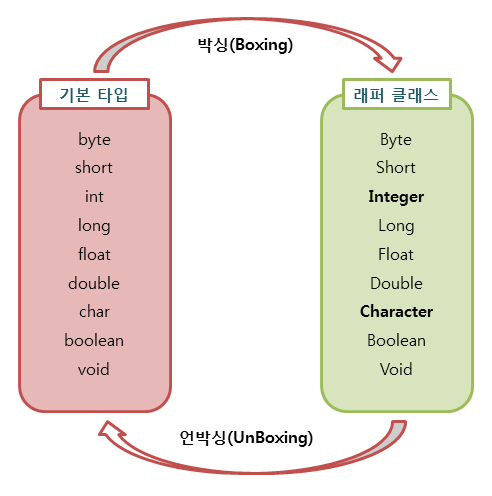
23.5.2 ~ 23.5.19 사전 캠프 기간의 TIL 기록이다.
TIL: Today I Learned
type check
Wrapper class type
public static void main(String[] args) {
String t1 = "TEST";
System.out.println(t1.getClass().getName());
//java.lang.String
Integer t2 = 7777;
System.out.println(t2.getClass().getName());
//java.lang.Integer
List<Integer> t3 = new ArrayList<>();
System.out.println(t3.getClass().getName());
// java.util.ArrayList
}Primitive type
public static void main(String[] args) {
int a1 = 3;
float a2 = 5;
double a3 = 7;
System.out.println(Integer.class.isInstance(a1)); //true
System.out.println(Float.class.isInstance(a2)); //true
System.out.println(Double.class.isInstance(a3)); //true
}오버로딩으로 primitive typeof 구현 가능
class Check {
public static Class<Integer> typeof(final int expr) {
return Integer.TYPE;
}
public static Class<Long> typeof(final long expr) {
return Long.TYPE;
}
public static Class<Float> typeof(final float expr) {
return Float.TYPE;
}
public static Class<Double> typeof(final double expr) {
return Double.TYPE;
}
// ...
}Wrapper class

public static void main(String[] args) {
Integer num1 = new Integer(7); // 박싱
Integer num2 = new Integer(3); // 박싱
int int1 = num1.intValue(); // 언박싱
int int2 = num2.intValue(); // 언박싱
Integer result1 = num1 + num2; // 10
Integer result2 = int1 - int2; // 4
int result3 = num1 * int2; // 21
}JDK 1.5부터는 적절히 오토 박싱/언박싱이 된다.
Wrapper는 객체고 객체끼리는 일반적인 연산이나 비교가 안된다. 위 코드의 연산은 오토 박싱/언박싱으로 동작한 것
wrapper class tcp school
⬆ 다른 챕터도 볼 만한거 많아보인다.
표현식
- Lambda expression
- method reference
public static void main(String[] args) {
Integer t = -3;
//람다표현식
Function<Integer, Integer> func = (a) -> Math.abs(a);
Function<Integer, Integer> func = (a) -> {
System.out.println("lambda");
return Math.abs(a);
};
//메서드 참조
Function<Integer, Integer> func2 = Math::abs;
// function interface 실행은 apply 메서드
System.out.println(func.apply(t)); //3
System.out.println(func2.apply(t)); //3
}ArrayList
List 자료형 중 하나
List to Array
public static void main(String[] args) {
List<Integer> t = new ArrayList<>();
for (int i = 0; i < 10; i++) {
t.add((int) Math.pow(i, 2));
}
//List -> primitive[]
int[] t2 = t.stream().mapToInt(Integer::intValue).toArray();
//List -> Wrapper[]
Integer[] t3 = t.toArray(new Integer[t.size()]);
System.out.println(t2.getClass().getName());
}이름붙은 반복문
반복문에 이름을 붙여 하나 이상의 반복문을 벗어날 수 있다.
while/for, break/continue 다 가능하다.
public static void main(String[] args) {
allLoop : for (int i = 2; i < 10; i++) {
for (int j = 1; j < 10; j++) {
if (i == 5) {
continue allLoop; //이중 루프 벗어나서 바로 continue
}
System.out.println(i + " * " + j + " = " + (i * j));
}
}
} public static void main(String[] args) {
int i = 2;
allLoop :
while (true) {
for (int j = 1; j < 10; j++) {
if (i == 5) {
break allLoop; //이중 루프 벗어나서 바로 break
}
System.out.println(i + " * " + j + " = " + (i * j));
}
i++;
}
}Array, String
- Array 주요 메서드
- equals()
- toString()
- copyOf()
- copyOfRange()
- sort()
- String 주요 메서드
blabla
자바는 입력 값들도 원시값이 아닌 객체이길 원하는 듯 하다.
collection객체들에서 사용하는 stream method를 알아보자.


